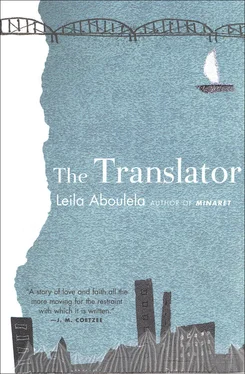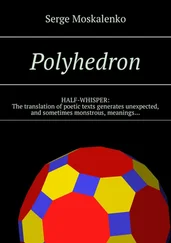‘Did you ever fall?’
‘No.’ She laughed and it was as if the landing was warm like the nights in Khartoum she had been describing.
In the car, she told Rae, ‘Am Ahmed’s wife smiled at her all the time. She had a gold tooth which Sammar tried to pull out and this made the woman laugh with her dimples and fat arms. She gave Sammar one of her gold bracelets instead. It was too big. Sammar pushed it up on to her arm, tried it on the other arm, dropped in on the floor and had to scramble down to pick it up.
Her aunt’s house was full of lights. Those first garden lights would blur with other lights, party lights in the years to come, wedding lights. The cars were parked on the driveway, and on the road outside. Sammar saw her parents with her baby brother Waleed, they were now not interested in her, absorbed in the relatives and friends they had not seen for years. And though reassured that they were near, she was not interested in them either. She was too aware of everyone and everything around her. The newness of the warm night, the shabby cars, and the big house that was before her. A lighted house in front of an empty square that was covered in darkness. A square that was large and mysterious; broken glass lay on its dust, dogs barked their way through the rubbish that was dumped there. Underneath the carport, as they walked inside, Sammar showed Hanan the bracelet, let her try it on. They compared the length of their arms, the size of their wrists. A beginning. In years to come they would compare their polished nails, the hair on their arms, the lines on their palms.
Her aunt, Mahasen, was the tall woman in the sun-coloured tobe, the woman who had not come to the airport. She was part of the house, part of its lights. The woman who walked across the grass with an outstretched hand saying, ‘My brother…,’ and hugged Sammar’s father first. The woman examined baby Waleed and squealed, ‘He’s ugly, what kind of creation is this!’, and everyone laughed as she pinched his cheeks and kissed his forehead. Mahasen sat on one of the chairs in the garden and drew Sammar to her. Sammar took in the sudden perfume, the flowers embroidered on the sun-coloured tobe, its texture so close. Mahasen smoothed Sammar’s eyebrows with her thumb, touched her earlobes, her chin. ‘This is the one who pleases me,’ she said, with a laugh to her brother. And she stood up, so tall she was, so much embroidered and bright folds. ‘Come with me, Sammar.’
She held her aunt’s hand. Elegant hands that never washed dishes, never scrubbed floors. Inside the house, the floor was all speckled tiles, brown and black speckles, an imitation of marble. A huge expanse of hard, square tiles. Strange for Sammar. She was used to the unobtrusive carpets and wood of London’s flats. These tiles were for counting, for sliding across. Her aunt’s high-heeled sandals made a tapping noise on the tiles. Yellow sandals to match the tobe, red-brick toenails, heels that were regularly sloughed, daily massaged with cream. Her aunt’s bedroom had a large mirror, jars of lotions and creams. A transistor radio, a painting of gazelles, a huge bed with blue pillows. And on the side-table was what her aunt had brought her to see. A photograph of a girl feeding pigeons. The pigeons swarmed near her outstretched hands, one was perched on her frightened shoulder. The stone lion of Trafalger Square loomed above. ‘This is me!’ Sammar said. The first words she spoke in her aunt’s house.
‘That night,’ she said to Rae on the telephone, ‘that night like nearly every night, the grown-ups sat in the garden. When I got older I was allowed to sit with them, on seats with cool cushions and above us all the stars. Insects attacked the garden lights, those that got too close became black dots sticking to the hot glass. The garden was filled with sounds: laughter and loud narratives, the ceaseless croaking of frogs, the softer sounds of grasshoppers. And from the square, the stray dogs howled, a sound of faraway sadness.’
On that first night in Khartoum, she wandered around the garden with Hanan and Tarig, to the back of the house where there was no garden, inside the house, upstairs to the roof and its row of empty beds. Everywhere they went, Tarig did what Hanan and Sammar would not do. In the garden he took off his sandals and walked in the mud of the flower beds. He tore the leaves off the eucalyptus tree. There was a swing in the far corner of the garden. He swung on it standing up and when he was very high, he jumped off, effortlessly, without fear.
At the back of the house was the smell of flames and marinated lamb. The cook grilled kebabs on a coal fire. He wore ajellabia and his eyes were red. He sat on a small stool and fanned the flames with a newspaper. Tarig squatted next to him, and reached out for a piece of meat. The cook hit him with the newspaper over his head, ‘Get away, you’ll burn yourself.’ But Tarig laughed, ducked from another blow and grabbed a piece of meat, grey, still barely cooked. And he disgusted them all by chewing and chewing on the piece of meat and then spitting it away. ‘My brother is horrible,’ Hanan said to Sammar. ‘I hate him.’ Sammar was distracted by Tarig, her eyes fixed on him. She liked her cousin Hanan better.
On the roof, they looked down over the railings at their parents below. They were sitting in a large circle, they never looked up. Some of the men were smoking and their cigarettes made pretty little red lights that moved from side to side. On the roof the sky was bigger than the house and the square. The darkness was speckled with stars, speckled like the house’s tiles, except that the sky’s speckles were not still. Suddenly, a large grey shadow climbed through the transparent clouds, blinking red lights, a deep roar. ‘That’s your airplane,’ Tarig said, looking up. He had been leaning too far over the rail. Now he swung back, his hands clutching the top of the rail, his whole weight carried by his arms. ‘Our airplane?’ Sammar didn’t understand. ‘It’s the airplane you came on,’ he said, ‘it’s going back to London without you.’
On the telephone, Rae coughed, ‘Sorry. Excuse me Sammar.’ He put the receiver down to blow his nose, clear his throat, spit into a handkerchief. She could hear him.
They talked about her father and aunt, how fast things change in that part of the world. He asked her questions. ‘And why is that?’ he asked. After she answered he was silent, as if he was thinking about what she had said. She imagined him wiping his face with his hand.
They talked about Khartoum. Khartoum, where the Blue and the White Niles met under the bridge, under the sun, and across the bridge Umdurman, where saints were buried and something old and whole was in the air. Above the sand and the sound of the wind, everything held together, connected. He knew the details of her country’s history more than she did, the correct dates. They both knew the names… the Mahdi, Gordon, the Khalifa, Kitchener and Wingate.
‘There is a statue,’ said Rae, ‘of Gordon in Aberdeen. In Schoolhill. Have you see it?’
‘No.’ She did not see much, she walked around asleep.
‘You might like to look at it sometime.’ A plaque in stone, the words died in Khartoum 1885.
‘I didn’t know he was Scottish. They didn’t teach us that at school.’
‘It was the British…’
‘The Ingeleez …’ They laughed and the wind rattled the front door a little and passed.
He said that he had never been to Khartoum. There were plans once but they did not materialise. She said, ‘I wish you would see it. It’s beautiful…’ and paused, wanting to say more, to describe in words: simple, authentic, subservient to nature. Her voice was sad when she said, ‘But it is not considered beautiful…’
Читать дальше












